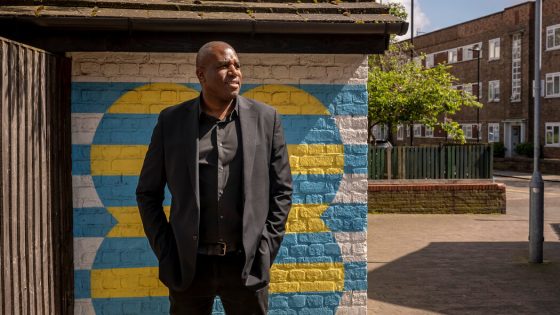Few British politicians have American ties as deep as those of David Lammy, who is set to become Britain’s foreign secretary if the opposition Labour Party wins the coming election, as the polls suggest it will.
A son of Guyanese immigrants who grew up poor in working-class London, he spent summers with relatives in Brooklyn and Queens, working at Con Edison, before earning a master’s degree at Harvard Law School and befriending Barack Obama, for whom he canvassed in Chicago during his first presidential campaign.
Yet now, on the cusp of becoming Britain’s chief diplomat, Mr. Lammy finds himself facing an uncertain, even potentially hostile, American political landscape. President Biden and the Democrats, with whom Mr. Lammy has cultivated a deep network of contacts, are fighting to hold off a resurgent Donald J. Trump.
Having been chosen by the Labour leader, Keir Starmer, partly because of his trans-Atlantic credentials, Mr. Lammy, 51, is scrambling to build ties with Republicans and, more challengingly, with those around Mr. Trump. It’s a very different American establishment from the Democratic one he knows so well.
Would Mr. Lammy pay a visit to Mar-a-Lago, Mr. Trump’s Palm Beach estate, as David Cameron, Britain’s current foreign secretary, did two weeks ago to lobby the former president on military aid to Ukraine?
“Of course,” he said in an interview this week in Portcullis House, the parliamentary office building across the street from Big Ben. Noting that he was headed soon to New York and Washington, he said, “I’m happy to talk to whomever the American people decide they want to run the country.”
That’s a time-tested answer for any foreign politician during an American election year, especially one from a party that has held a double-digit polling lead over the governing Conservatives for 18 months. But unlike many Europeans, who regard Mr. Trump with a mix of fear and bemusement, Mr. Lammy genuinely seems to believe he can find common ground with those in Mr. Trump’s orbit.
He has held meetings with former Trump officials like Mike Pompeo, who served as secretary of state and C.I.A. director, and Robert C. O’Brien, who was Mr. Trump’s last national security adviser. And he has struck up a relationship with Senator J.D. Vance, the Ohio Republican and enthusiastic Trump convert.
Mr. Vance’s best-selling memoir, “Hillbilly Elegy,” he said, bore parallels to his own story, growing up with a single mother and an absent, alcoholic father, in Tottenham, where race riots convulsed the streets. Mr. Lammy, whose memoir is titled “Out of the Ashes,” said Mr. Vance’s book “reduced me to tears.”
“I said to J.D., ‘Look, we’ve got different politics, but we’re both quite strong Christians and we both share quite a tough upbringing,’” said Mr. Lammy, who would be Britain’s second Black foreign secretary after James Cleverly, a Conservative.
The challenge for Mr. Lammy is that he shares more with Mr. Obama, who was a few years ahead of him at Harvard. The two men, who met 20 years ago at a gathering for Black alumni, had dinner when Mr. Obama visited London last month. In Mr. Obama’s Washington office hangs a portrait of the former president made by Mr. Lammy’s wife, Nicola Green, an artist who chronicled his 2008 campaign.
One of Mr. Obama’s former advisers, Benjamin J. Rhodes, introduced Mr. Lammy to other Democratic lawmakers and has also become a friend. In the event of a Labour government and a second Biden administration, he predicted, “You would see a much more aligned U.S. and U.K. relationship.”
But Mr. Rhodes said Mr. Lammy’s gregarious manner and pragmatic politics would give him at least a fighting chance with a Trump administration. “I think he believes that through force of personality, he could develop relationships in that circle,” Mr. Rhodes said.
For now, Mr. Lammy is determined not to offend. Asked about Mr. Trump’s recent statement that he would tell the Russians to do “whatever the hell they want” to any NATO member that did not pay its fair share of the alliance’s costs, Mr. Lammy seized on the reference to burden sharing.
“Is Donald Trump right?” he said. “100 percent.”
Too many NATO countries, Mr. Lammy said, still failed to meet the alliance’s target of military spending equal to 2 percent of gross domestic product (Britain spends roughly 2.2 percent). The Labour Party has vowed to raise that to 2.5 percent, and Mr. Lammy accused the Conservatives of bleeding Britain’s armed forces down to a size they had not seen since the Napoleonic era.
“I recognize in Donald Trump an ability to use language to concentrate minds,” he said.
Other Labour veterans bear no illusions about the chemistry between a Labour government and Mr. Trump. The former president clashed with Theresa May, a Conservative prime minister, though he had better relations with Boris Johnson and praised the current prime minister, Rishi Sunak, for seeking to water down Britain’s climate goals. Mr. Cameron, years before he visited Mar-a-Lago, called Mr. Trump’s threat to ban Muslims from entering the United States “divisive, stupid and wrong.”
“A Trump government would be very difficult for a Labour government, but it would also be difficult for a Rishi Sunak government,” said Jonathan Powell, who served as chief of staff to a Labour prime minister, Tony Blair.
With the risk of a turbulent stretch in trans-Atlantic relations, Mr. Lammy is emphasizing Britain’s own neighborhood. In a new essay in Foreign Affairs magazine that lays out a foreign policy based on what he calls “progressive realism,” he said Britain needed to focus on rebuilding its security ties with the European Union, which have withered in the aftermath of Brexit.
Mending fences with Europe, Mr. Lammy said, was necessary regardless of whether Mr. Biden or Mr. Trump wins in November because the United States is increasingly preoccupied by its rivalry with China.
“For that reason, the U.K. must play its part here in Europe,” Mr. Lammy said, adding that Labour was better placed than the Conservatives to rebuild trust because of European suspicion of Brexiteers like Mr. Johnson. “Europe is keen to turn the page. The United States is keen for the U.K. to turn the page.”
Even as their strategic priorities diverge, the United States and Britain remain lashed together in conflict zones like the Middle East. British and American warplanes jointly helped repel Iran’s aerial assault on Israel.
Britain’s position on the Israel-Gaza war mirrors that of the United States, and Labour has stayed largely in sync with the Conservatives, despite pressure from its left wing to take a harder line on Israel. Mr. Lammy described the conditions in Gaza as “hell on earth,” but he has not called for Britain to suspend arms sales to Israel, as have legal experts and some members of Parliament.
While Mr. Lammy said he was “very concerned” that Israel might be violating international law, which would trigger a suspension of arms exports, he did not want to get ahead of a judgment by the government’s lawyers.
“I’m also very conscious that I and Keir Starmer might be officeholders” within the coming weeks, Mr. Lammy said, pointing to speculation that if the Conservatives suffer dire losses in local elections in early May, Mr. Sunak might call a general election.
As he contemplated that possibility, Mr. Lammy’s thoughts came back to the United States, where he said the struggles of civil rights leaders like the Rev. Dr. Martin Luther King Jr. and the election of Mr. Obama symbolized a bend in the moral arc toward racial justice that has transformed Britain as well.
“If I have the privilege of becoming foreign minister,” he said, “I’m very conscious that I’ll be the first — it almost makes me emotional as I say it — the first foreign secretary who is the descendant of enslaved people.”
Source Agencies



